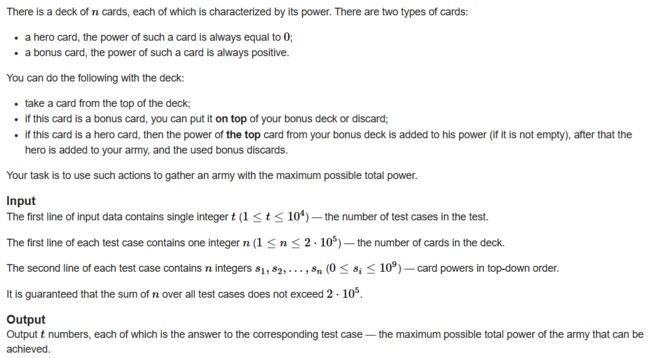Codeforces Round 855 (Div. 3)(A~F)
A. Is It a Cat?
定义满足条件的字符串为:其中仅可能含有meow四种字母的大小写,而且相同种类的字母必须挨在一起,四种字母的顺序必须按照meow排列。给出一个字母串,求是否满足条件。
思路:感觉是个很麻烦的模拟。首先把大小写全都转为小写字母,再把相同的字母合并,最后判断一下字母的种类和顺序。
AC Code:
#include
typedef long long ll;
const int N = 1e6 + 5;
int t, n;
std::string s;
int main() {
std::ios::sync_with_stdio(false);
std::cin.tie(0);
std::cout.tie(0);
std::cin >> t;
while(t --) {
std::cin >> n >> s;
std::vector vec;
char c;
if(s[0] >= 'A' && s[0] <= 'Z')
vec.push_back((char)(s[0] - 'A' + 'a')), c = (char)(s[0] - 'A' + 'a');
else
vec.push_back(s[0]), c = s[0];
for(int i = 1; i < n; i ++) {
if(s[i] >= 'A' && s[i] <= 'Z')
s[i] = (char)(s[i] - 'A' + 'a');
if(s[i] != c)
vec.push_back(s[i]), c = s[i];
}
if(vec.size() == 4 && vec[0] == 'm' && vec[1] == 'e' && vec[2] == 'o' && vec[3] == 'w')
std::cout << "YES" << '\n';
else
std::cout << "NO" << '\n';
}
return 0;
} B. Count the Number of Pairs
给出一个字符串,对于同一种字母,一个大写一个小写可以凑成一对;给出k次操作,可以将任意一个字母大小写翻转,问给出的字符串中最多可以有多少对字母。
思路:统计字符串中大小写字母的个数,先统计不经过修改可以得到多少串,然后拥挤通过修改可以最多得到多少对即可。
AC Code:
#include
typedef long long ll;
const int N = 1e6 + 5;
int t, n, k;
std::string s;
int main() {
std::ios::sync_with_stdio(false);
std::cin.tie(0);
std::cout.tie(0);
std::cin >> t;
while(t --) {
std::cin >> n >> k >> s;
int ans = 0;
std::unordered_map mpl, mpu;
for(int i = 0; i < n; i ++) {
if(s[i] >= 'a' && s[i] <= 'z')
mpl[s[i]] ++;
else
mpu[s[i]] ++;
}
for(auto [x, y] : mpl) {
if(y && mpu[x - 'a' + 'A']) {
ans += std::min(y, mpu[x - 'a' + 'A']);
mpl[x] -= std::min(y, mpu[x - 'a' + 'A']);
mpu[x - 'a' + 'A'] -= y, mpu[x - 'a' + 'A'];
}
}
for(auto [x, y] : mpl) {
if(y >= 2) {
int res = std::min(k, y / 2);
ans += res, k -= res, y -= res * 2;
}
}
for(auto [x, y] : mpu) {
if(y >= 2) {
int res = std::min(k, y / 2);
y -= res * 2, ans += res, k -= res;
}
}
std::cout << ans << '\n';
}
return 0;
} C. Powering the Hero
给出一个数组,其中非0的数字可以被存下来,放在一堆中;为0的数可以加上现有的非0数中的一个数。求所有的为0的值,通过修改得到的和最大是多少。
思路:优先队列即可,每次遇到一个非0的数,就将其放进队列中,遇到为0的数就取出队列中最大的数加入答案,并pop出队列,easy版本做法与hard版本相同,时间复杂度O(nlogn),能过。
AC Code:
#include
typedef long long ll;
const int N = 1e6 + 5;
int t, n;
ll a[N];
int main() {
std::ios::sync_with_stdio(false);
std::cin.tie(0);
std::cout.tie(0);
std::cin >> t;
while(t --) {
std::cin >> n;
std::priority_queue pq;
ll ans = 0;
for(int i = 1; i <= n; i ++) {
std::cin >> a[i];
if(a[i])
pq.push(a[i]);
if(!a[i] && !pq.empty()) {
ans += pq.top();
pq.pop();
}
}
std::cout << ans << '\n';
}
return 0;
} D. Remove Two Letters
在字符串中去掉任意两个相连的字母,剩下的串相连,求可以得到多少种不同的字符串。
思路:一开始想hash,但是又不太会hash,又感觉hash很容易被卡。可以这样考虑,从头开始,每次向后转移去掉的两个字母,就是加上上一对字母的前一个,去掉后一对字母的后一个,那直接比较这两个字母即可,只要不同,就对答案有贡献。
AC Code:
#include
typedef long long ll;
const int N = 1e6 + 5;
int t, n;
std::string s;
int main() {
std::ios::sync_with_stdio(false);
std::cin.tie(0);
std::cout.tie(0);
std::cin >> t;
while(t --) {
std::cin >> n >> s;
int ans = 0;
for(int i = 1; i < n - 1; i ++) {
if(s[i - 1] != s[i + 1]) {
ans ++;
}
}
std::cout << ans + 1 << '\n';
}
return 0;
} E. Unforgivable Curse
给出两个字符串s和t,目标是把s修改为t,每次修改可以交换相距k或k+1位置的字母,问是否能修改成功。
思路:很显然,如果某个字符需要修改,但是它距离左右边界的距离都小于k,那必然没法修改。对于其他的位置,我们一定可以找到两个位置互换的方法,即可以通过中间字符修改,而顺着修改的顺序逆着回去,可以复原原来在正确位置的字母。easy版本与hard版本相同。
AC Code:
#include
typedef long long ll;
const int N = 1e6 + 5;
int T, n, k;
std::string s, t;
int main() {
std::ios::sync_with_stdio(false);
std::cin.tie(0);
std::cout.tie(0);
std::cin >> T;
while(T --) {
std::cin >> n >> k;
std::cin >> s >> t;
std::map mp, mpp;
for(int i = 0; i < n; i ++) {
mp[s[i]] ++;
mpp[t[i]] ++;
}
bool flag = true;
for(auto [x, y] : mp) {
if(y != mpp[x]) {
flag = false;
break;
}
}
if(!flag) {
std::cout << "NO" << '\n';
continue;
}
for(int i = 0; i < n; i ++) {
if(s[i] != t[i] && std::max(i, n - i - 1) < k) {
flag = false;
break;
}
}
std::cout << (flag ? "YES" : "NO") << '\n';
}
return 0;
} F. Dasha and Nightmares
给出n个字符串,问有多少对不同的字符串,使得两个字符串连接起来满足以下条件:字符串中包含25个不同的字母;每个字母的个数为奇数个;字符串长度为奇数。
思路:思路来自cup_pyy佬。考虑哈希。但是显然STL自带的哈希表很容易会被卡掉,就需要一些高端方法自定义哈希表,因为是奇数,所以可以采用位运算实现代码。用二进制下的26位数字存所有的目标字符串,开26个哈希表存对于每个字母不存在时满足条件的方案数。
AC Code:
#include
typedef long long ll;
#define int long long
const int N = 2e5 + 5;
int n;
int num[30], cnt[30];
std::string s;
struct custom_hash {
static uint64_t splitmix64(uint64_t x) {
x += 0x9e3779b97f4a7c15;
x = (x ^ (x >> 30)) * 0xbf58476d1ce4e5b9;
x = (x ^ (x >> 27)) * 0x94d049bb133111eb;
return x ^ (x >> 31);
}
size_t operator()(uint64_t x) const {
static const uint64_t FIXED_RANDOM = std::chrono::steady_clock::now().time_since_epoch().count();
return splitmix64(x + FIXED_RANDOM);
}
};
signed main() {
std::ios::sync_with_stdio(false);
std::cin.tie(0);
std::cout.tie(0);
std::cin >> n;
for(int i = 0; i < 26; i ++) {
num[i] = ((1 << 26) - 1) ^ (1 << i);
}
std::unordered_map mp[26];
for(int i = 0; i < 26; i ++)
mp[i].reserve(n);
int ans = 0;
for(int i = 0; i < n; i ++) {
std::cin >> s;
int mask = 0;
memset(cnt, 0, sizeof(cnt));
for(auto u : s)
cnt[u - 'a'] ++;
for(int i = 0; i < 26; i ++) {
if(cnt[i] & 1)
mask ^= (1 << i);
}
for(int i = 0; i < 26; i ++) {
if(!cnt[i] && mp[i].count(mask ^ num[i]))
ans += mp[i][mask ^ num[i]];
}
for(int i = 0; i < 26; i ++) {
if(!cnt[i])
mp[i][mask] ++;
}
}
std::cout << ans << '\n';
return 0;
} 




